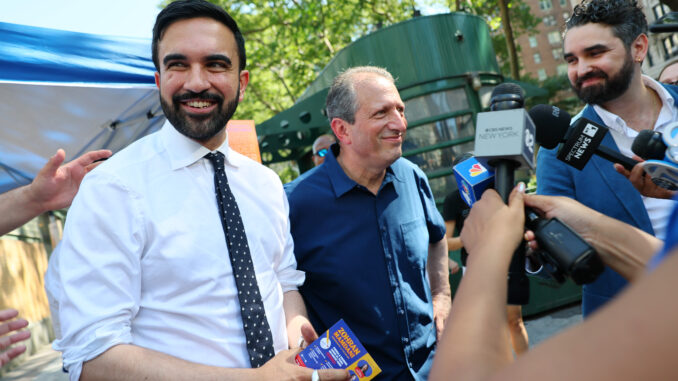
The Unexpected Architect: Zohran Mamdani's Rise to the Mayoral Stage
The air crackled with disbelief, a stunned silence settling over the election night party like a sudden squall. Projected onto the oversized screen, the numbers blinked ominously: Mamdani – 48%, Adams – 22%, Wiley – 15%. It wasn't a gradual surge, a steady climb built on incremental gains. This was a seismic shift, a political earthquake that reverberated through the city’s established power structures. State Assemblyman Zohran Mamdani, a relative newcomer with a socialist agenda and a penchant for challenging the status quo, had taken a commanding lead in the Democratic Primary for New York City mayor.
The narrative leading up to this improbable victory had been one of the familiar dance of political endorsements, carefully curated media appearances, and the quiet thrum of entrenched interests. Eric Adams, the seasoned borough president, was the perceived frontrunner, carrying the weight of experience and a track record of pragmatic solutions. Maya Wiley, with her progressive credentials and influential supporters, was expected to offer the strongest challenge. Zohran Mamdani, meanwhile, was the underdog, the progressive firebrand dismissed by many as too idealistic, too radical to garner mainstream support. He was seen as a voice for the marginalized, the renter, the working class – a crucial voice, perhaps, but not one destined for the highest office.
But something shifted in the weeks leading up to the primary. A perfect storm of discontent, fueled by rising rents, systemic inequality, and a growing disillusionment with the political establishment, brewed beneath the surface of the city. Mamdani, armed with a sharp wit, an unwavering commitment to his principles, and a knack for connecting with voters on a deeply personal level, tapped into this potent current.
His campaign wasn’t built on glossy brochures and expensive television ads. Instead, it thrived on grassroots organizing, leveraging the power of social media and the tireless energy of young volunteers. He spoke of rent control as a fundamental human right, not a radical pipe dream. He championed the Green New Deal for New York City, painting a vision of a sustainable future with accessible public transportation and green jobs. He challenged the real estate lobby’s stranglehold on the city, promising to prioritize the needs of residents over the profits of developers.
This message resonated powerfully with a generation disillusioned by the slow pace of change. Renters, burdened by crippling costs, saw in him a genuine advocate. Young activists, energized by the climate crisis and social justice movements, found in him a leader willing to take bold action. Even long-time residents, weary of the same old political promises, were drawn to his authenticity and his unapologetic commitment to fighting for the underdog.
Mamdani's success wasn't just about policy, however. It was about his ability to articulate the anxieties and aspirations of ordinary New Yorkers. He spoke with a candor and vulnerability that was refreshing in the often-cynical world of politics. He wasn't afraid to admit mistakes, to engage in uncomfortable conversations, to challenge the assumptions of those in power. He wasn't just a politician; he was a neighbor, a community organizer, a voice for the voiceless.
Of course, the established political machine fought back. They painted him as an extremist, a socialist, a threat to the city's economic stability. They tried to undermine his credibility, to discredit his ideas, to sow doubt in the minds of voters. But their attacks only seemed to strengthen his resolve, to solidify his base, to galvanize his supporters. The more they tried to silence him, the louder his voice became.
The election results were a resounding rebuke of the status quo. They were a testament to the power of grassroots organizing, the enduring appeal of progressive values, and the hunger for authentic leadership in a city grappling with profound challenges.
The journey ahead for Mayor Mamdani promises to be fraught with challenges. Navigating the complex web of city government, dealing with powerful special interests, and implementing his ambitious policy agenda will require political acumen, strategic negotiation, and unwavering determination. But his unexpected victory serves as a powerful reminder that even in the most entrenched systems, change is possible. It's a testament to the enduring power of hope, the enduring strength of the human spirit, and the enduring belief that a better world is possible, even in the heart of the city that never sleeps. It's a message that resonates far beyond the boundaries of New York City, offering a beacon of hope for those seeking a more just and equitable future. The architect of this unexpected turn, Zohran Mamdani, now has the opportunity, and the responsibility, to build it.
